Unit 5 Do you have a soccer ball? Section B 词汇 课件(共18张PPT)
文档属性
| 名称 | Unit 5 Do you have a soccer ball? Section B 词汇 课件(共18张PPT) | 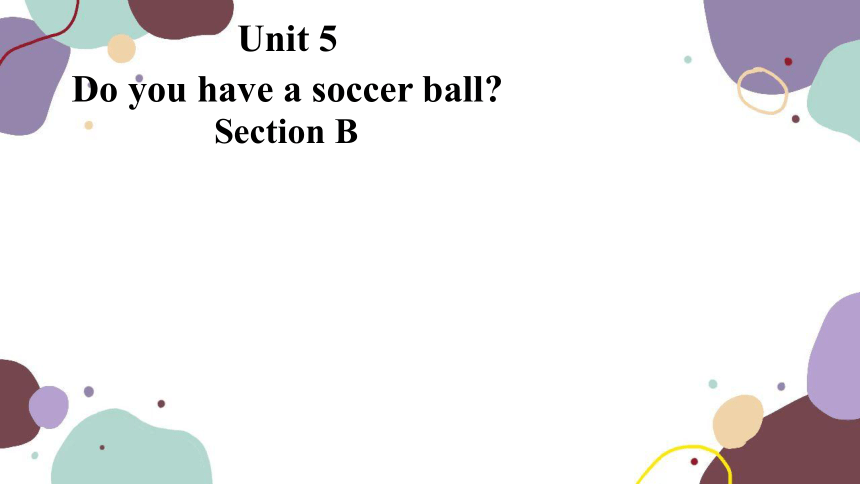 | |
| 格式 | pptx | ||
| 文件大小 | 955.0KB | ||
| 资源类型 | 教案 | ||
| 版本资源 | 人教新目标(Go for it)版 | ||
| 科目 | 英语 | ||
| 更新时间 | 2022-07-12 17:52:53 | ||
图片预览

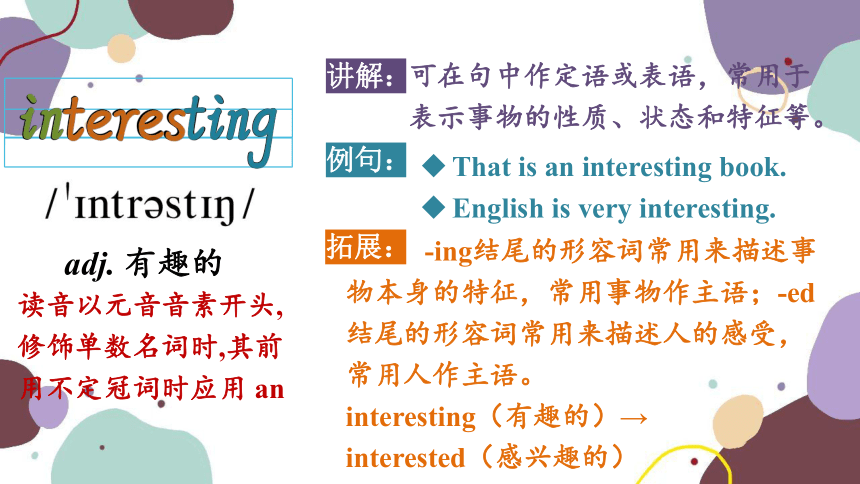
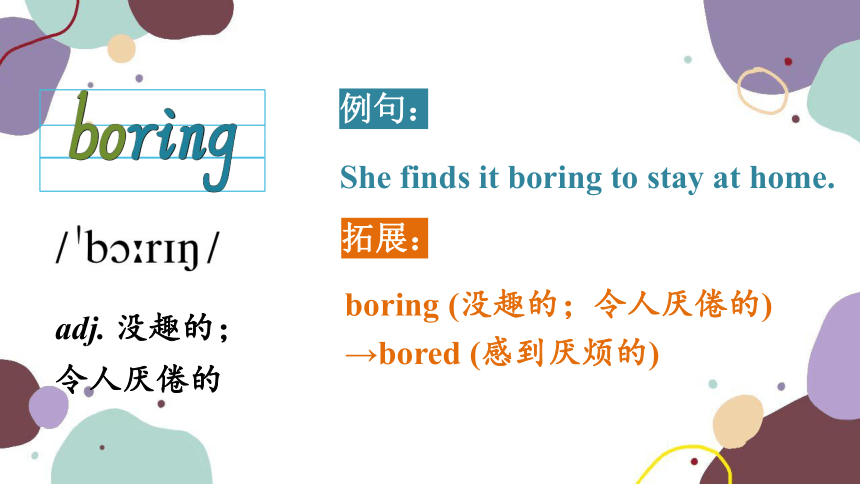
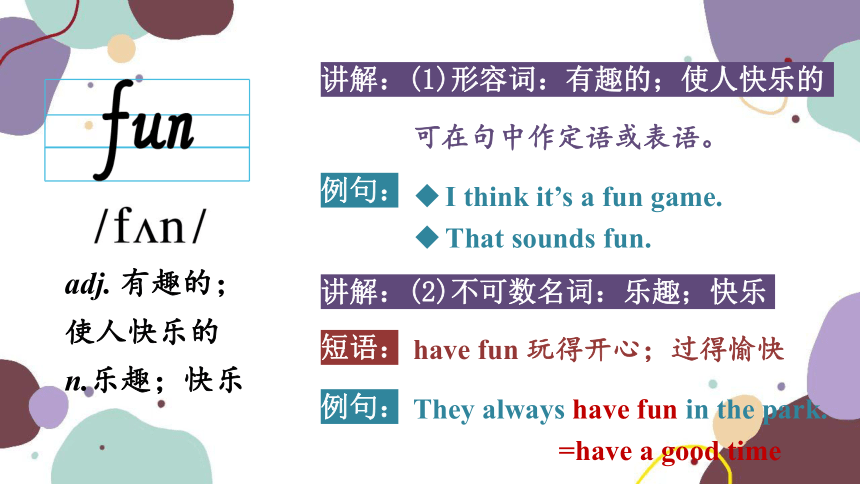

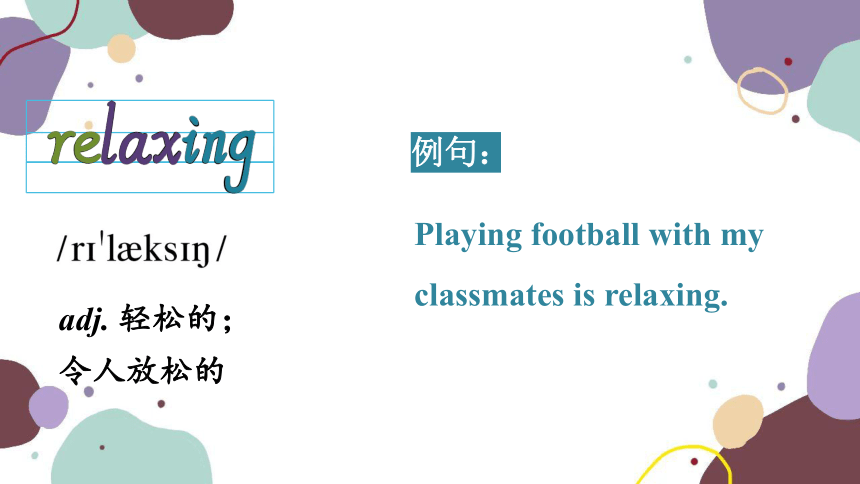
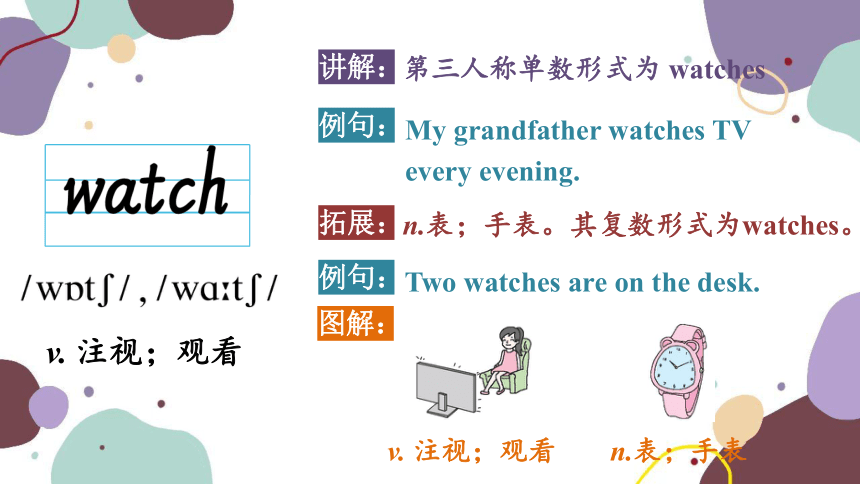
文档简介
(共18张PPT)
Unit 5
Do you have a soccer ball
Section B
adj. 有趣的
讲解:
读音以元音音素开头,修饰单数名词时,其前用不定冠词时应用 an
例句:
That is an interesting book.
English is very interesting.
可在句中作定语或表语,常用于表示事物的性质、状态和特征等。
拓展:
-ing结尾的形容词常用来描述事物本身的特征,常用事物作主语;-ed结尾的形容词常用来描述人的感受,常用人作主语。
interesting(有趣的)→
interested(感兴趣的)
adj. 没趣的;令人厌倦的
拓展:
boring (没趣的;令人厌倦的)
→bored (感到厌烦的)
例句:
She finds it boring to stay at home.
adj. 有趣的;使人快乐的
n.乐趣;快乐
讲解:(1)形容词:有趣的;使人快乐的
可在句中作定语或表语。
讲解:(2)不可数名词:乐趣;快乐
I think it’s a fun game.
That sounds fun.
have fun 玩得开心;过得愉快
例句:
短语:
They always have fun in the park.
例句:
=have a good time
adj. 困难的
例句:
English is difficult for me.
adj. 轻松的;令人放松的
例句:
Playing football with my classmates is relaxing.
My grandfather watches TV
every evening.
v. 注视;观看
讲解:
第三人称单数形式为 watches
例句:
拓展:
n.表;手表。其复数形式为watches。
Two watches are on the desk.
例句:
图解:
n.表;手表
v. 注视;观看
n. =
电视;电视机
例句:
My grandfather watches TV every evening.
短语:
看电视
adj. 相同的
讲解:
常用作定语,其前通常有定冠词 the。
例句:
Grace and I are in the same class.
反义词:
different 不同的
例句:
My sister and I are in the same school, but in different classes.
v. 喜欢;喜爱
讲解:
其后可接名词、代词、动词不定式或动词 –ing 形式作宾语。like 的近义词是 love,其用法与 love 基本相同。
例句:
Sally likes apples.
We like to play tennis after school.
My aunt likes watching TV plays.
Mum, I love you!
v. & n. 爱;喜爱
prep. 和……在一起;带有;使用
辨析:with与and
两者均可表示“和;与”,其区别如下
例句:
Can you play soccer with me after school
Alice is a girl with big eyes.
Jim writes with a pencil.
with
后常接名词或代词的宾格,表示伴随状态,在句中作状语。
连接两个并列成分,如两个并列的名词、动词或形容词等。
and
连词
介词
n. 体育运动
sports meeting 运动会
sports shoes 运动鞋
例句:
I always play sports with my friends.
短语:
do/have/play sports
做运动;参加体育活动或比赛
注意:
当 sport 作定语修饰名词时,常用其复数形式。
pron. 他(她、它)们
讲解:
是人称代词 they 的宾格形式,常用于动词或介词后作宾语。
例句:
Write them down.
adv. 只;仅
讲解:
常位于 be 动词、助动词或情态动词之后,实义动词之前,有时也放在表强调的特殊位置。
例句:
There is only one library in our school.
Mr. Green only has a daughter.
Only Jim likes playing computer games. (表强调)
adj. 容易的;不费力的
串记:
English is difficult for my grandma, but it’s easy for me.
反义词:
difficult 困难的
常在句中作定语或表语。
讲解:
例句:
It’s an easy question.
做介词时,其后可接名词、代词或动词 –ing 形式。其反义词为 before,意为“在……以前”。
prep. & conj. 在……以后
讲解:
例句:
Can you help me with my English after school
Please call me after you get home.
n.班级;课
例句:
◆ Our class is tidy.
◆ The class like Mr. Li very much.
讲解:
class 既可作可数名词,也可作不可数名词。作主语时,如果强调班级整体,谓语动词用单数形式;如果强调班里的每个成员,谓语动词用复数形式。
n. 同班同学
拓展:
类似的复合词还有 football (足球),schoolbag (书包),afternoon (下午)等。
构成:
“class ( n.班级) + mate ( n.伙伴)”
例句:
Kate and Mary are my classmates.
Unit 5
Do you have a soccer ball
Section B
adj. 有趣的
讲解:
读音以元音音素开头,修饰单数名词时,其前用不定冠词时应用 an
例句:
That is an interesting book.
English is very interesting.
可在句中作定语或表语,常用于表示事物的性质、状态和特征等。
拓展:
-ing结尾的形容词常用来描述事物本身的特征,常用事物作主语;-ed结尾的形容词常用来描述人的感受,常用人作主语。
interesting(有趣的)→
interested(感兴趣的)
adj. 没趣的;令人厌倦的
拓展:
boring (没趣的;令人厌倦的)
→bored (感到厌烦的)
例句:
She finds it boring to stay at home.
adj. 有趣的;使人快乐的
n.乐趣;快乐
讲解:(1)形容词:有趣的;使人快乐的
可在句中作定语或表语。
讲解:(2)不可数名词:乐趣;快乐
I think it’s a fun game.
That sounds fun.
have fun 玩得开心;过得愉快
例句:
短语:
They always have fun in the park.
例句:
=have a good time
adj. 困难的
例句:
English is difficult for me.
adj. 轻松的;令人放松的
例句:
Playing football with my classmates is relaxing.
My grandfather watches TV
every evening.
v. 注视;观看
讲解:
第三人称单数形式为 watches
例句:
拓展:
n.表;手表。其复数形式为watches。
Two watches are on the desk.
例句:
图解:
n.表;手表
v. 注视;观看
n. =
电视;电视机
例句:
My grandfather watches TV every evening.
短语:
看电视
adj. 相同的
讲解:
常用作定语,其前通常有定冠词 the。
例句:
Grace and I are in the same class.
反义词:
different 不同的
例句:
My sister and I are in the same school, but in different classes.
v. 喜欢;喜爱
讲解:
其后可接名词、代词、动词不定式或动词 –ing 形式作宾语。like 的近义词是 love,其用法与 love 基本相同。
例句:
Sally likes apples.
We like to play tennis after school.
My aunt likes watching TV plays.
Mum, I love you!
v. & n. 爱;喜爱
prep. 和……在一起;带有;使用
辨析:with与and
两者均可表示“和;与”,其区别如下
例句:
Can you play soccer with me after school
Alice is a girl with big eyes.
Jim writes with a pencil.
with
后常接名词或代词的宾格,表示伴随状态,在句中作状语。
连接两个并列成分,如两个并列的名词、动词或形容词等。
and
连词
介词
n. 体育运动
sports meeting 运动会
sports shoes 运动鞋
例句:
I always play sports with my friends.
短语:
do/have/play sports
做运动;参加体育活动或比赛
注意:
当 sport 作定语修饰名词时,常用其复数形式。
pron. 他(她、它)们
讲解:
是人称代词 they 的宾格形式,常用于动词或介词后作宾语。
例句:
Write them down.
adv. 只;仅
讲解:
常位于 be 动词、助动词或情态动词之后,实义动词之前,有时也放在表强调的特殊位置。
例句:
There is only one library in our school.
Mr. Green only has a daughter.
Only Jim likes playing computer games. (表强调)
adj. 容易的;不费力的
串记:
English is difficult for my grandma, but it’s easy for me.
反义词:
difficult 困难的
常在句中作定语或表语。
讲解:
例句:
It’s an easy question.
做介词时,其后可接名词、代词或动词 –ing 形式。其反义词为 before,意为“在……以前”。
prep. & conj. 在……以后
讲解:
例句:
Can you help me with my English after school
Please call me after you get home.
n.班级;课
例句:
◆ Our class is tidy.
◆ The class like Mr. Li very much.
讲解:
class 既可作可数名词,也可作不可数名词。作主语时,如果强调班级整体,谓语动词用单数形式;如果强调班里的每个成员,谓语动词用复数形式。
n. 同班同学
拓展:
类似的复合词还有 football (足球),schoolbag (书包),afternoon (下午)等。
构成:
“class ( n.班级) + mate ( n.伙伴)”
例句:
Kate and Mary are my classmates.
同课章节目录
- starters 预备篇(2012秋审查)
- Unit 1 Good morning !
- Unit 2 What’s this in English?
- Unit 3 What color is it ?
- Unit 1 My name's Gina.
- Section A
- Section B
- Unit 2 This is my sister.
- Section A
- Section B
- Unit 3 Is this your pencil?
- Section A
- Section B
- Unit 4 Where's my schoolbag?
- Section A
- Section B
- Unit 5 Do you have a soccer ball?
- Section A
- Section B
- Unit 6 Do you like bananas?
- Section A
- Section B
- Unit 7 How much are these socks?
- Section A
- Section B
- Unit 8 When is your birthday?
- Section A
- Section B
- Unit 9 My favorite subject is science.
- Section A
- Section B
